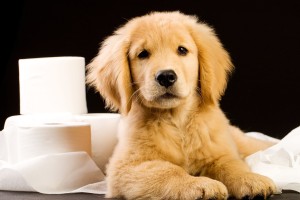 Like with human children, potty training your puppy can seem like an overwhelming and daunting exercise in futility—especially when it comes to those more stubborn breeds. Is there anything more frustrating than spending 30 minutes outside, begging your four-legged friend to go potty while it just sniffs around and looks at you with those big brown eyes—then, upon deciding it must not need to go, you bring it inside and watch as it squats in the middle of your favorite (most expensive) rug? All dog parents have been there—but before you tear up all your carpet, remove all rugs and give your canine the run of the house (while you sit in the bathroom, weeping silently and drinking straight from a bottle of wine because your life’s been taken over by an unruly puppy that you just love SO much), try these tips!
Like with human children, potty training your puppy can seem like an overwhelming and daunting exercise in futility—especially when it comes to those more stubborn breeds. Is there anything more frustrating than spending 30 minutes outside, begging your four-legged friend to go potty while it just sniffs around and looks at you with those big brown eyes—then, upon deciding it must not need to go, you bring it inside and watch as it squats in the middle of your favorite (most expensive) rug? All dog parents have been there—but before you tear up all your carpet, remove all rugs and give your canine the run of the house (while you sit in the bathroom, weeping silently and drinking straight from a bottle of wine because your life’s been taken over by an unruly puppy that you just love SO much), try these tips!
Frequent Trips Outside + Bribes (A.K.A. Rewards)
Puppies are crazy—they’re full of energy, always ready to explore, a bit lacking in the attention span department and rarely know what they want or need until it’s too late. If you’re the proud parent of a sweet puppy, know that you need to take that little sucker out as often as possible. I suggest every 2-3 hours, if not more. The moment you wake up, take little Rufus out. About two hours after he eats, take him out. The minute he wakes up from a puppy nap—you get the picture. Put your walking shoes and his leash next to the door and get ready for lots of quality time communing with nature. When Rufus goes potty outside, throw on that high-pitched, over-the-top puppy praise voice and go to town. Combine this with lots of patting, ear rubbing and even a treat and soon he’ll learn that pottying outside = positive feedback.
Crate Training
Crate training is not evil, like so many people believe. But if you don’t want to use a crate, designate some area of your house as your puppy’s own space—like a bathroom, laundry room, etc. Make it comfy for Rufus with towels, blankets or his own doggy bed. He’ll soon look at this as his home. For my puppies, I used the bathroom, as there were two of them and the floors are easy to clean. In the early stages, even after daytime potty training is going well, you may still experience accidents at night. However, giving your puppy his own home will help prevent this—as nobody wants to soil their OWN space, including dogs. And like a human child with its own crib, there will be nights your puppy won’t want to be separated from you. He’ll whine, cry, paw at the crate or door—let him. He’ll eventually wear himself out and fall asleep.
In the morning, if he’s pottied in his crate or room, give him a stern “No!” But don’t punish him as severely as you might if he potties in the living room or on your bed. Honestly, I don’t feel punishment works all that effectively, but if you choose to punish, make this punishment softer than the rest—after all, it’s hard for a puppy to “hold it” for 8+ hours while you snooze away. Eventually, he’ll gain more control of his bladder and night time accidents will stop.
Puppy Pee Pads
If you want, you CAN put down puppy potty pads and teach Rufus to use these when he needs to potty in the house; however, while they will keep your carpet less stained, they don’t do much in the way of fool-proof potty training. After all, Rufus is learning that pottying in the house is fine, so long as it’s on a pad. So, these are tricky. If you decide to use them, be consistent. You cannot punish him for going on the puppy pad, even if it’s your day off and in your mind the puppy pads are only meant for times he’s left alone for several hours. He can’t distinguish this. So just know, once you use them, he has carte blanche as far as the pads are concerned—though, you can always wean him off of them as he gets bigger.
Teach Rufus to Ring a Bell
Hang a bell on the doorknob of your front door—or where ever is convenient based on your pup’s height. Every time you and your pooch walk out the door for a potty break, make him ring the bell—either by bumping it with his nose or pawing at it. At first, you’ll have to puppet him. If you do this consistently, your pooch will eventually get the hang of it and learn to ring the bell whenever he needs to potty. It’s a very handy trick and great way to increase parent-pup communication.
Punishment vs. Reward
The problem with punishment during potty training is that you MUST catch them IN the act in order to punish them. You can’t find a 5-hour-old pee spot, punish Rufus for it and expect him to grasp what’s going on. Sure, if he squats right in front of you, give him a big “NO,” pick him up and take him outside—demonstrating to him the place you want him to potty. But I find reward to be much more effective. Spoil the heck out of him when he goes potty in the right place. If he has an accident in the house, clean it up, give him a disappointed look and ask yourself, “am I giving him the tools to succeed here? Am I taking him out enough?” Often times, accidents are more the fault of the parent than the pooch.

















